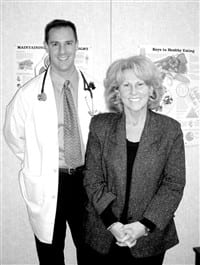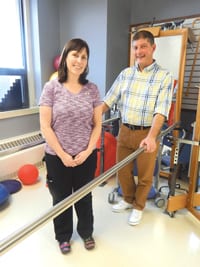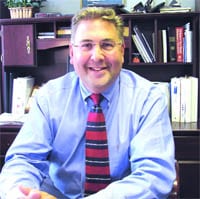Weighing In Area Physicians, Dietitians Speak Out On The Business of Healthy Eating Habits
It’s hard to know which way to turn in America’s diet maze.
In addition to trendy diets and products, there is new research available every day on various foods and diets that suggest the health benefits of both. Red wine has been shown to reduce the risk of heart disease, studies of flaxseed oil have suggested that it aids in weight maintenance, and oats are touted as a solution to some forms of high cholesterol, for example.
Even the Food and Drug Administration has thrown some of its clout toward specific foods; last month, the FDA made a qualified claim that monounsaturated fat from olive oil may reduce the risk of heart disease, and that claim can now be placed on labels of some foods containing olive oil.
Concurrently, there are rumblings about the benefits of the ‘Mediterranean Diet,’ which incorporates olive oil as well as fish, unrefined grains, and leafy vegetables into daily meals.
Many area nutrition experts back the Mediterranean Diet, as long as it is coupled with daily physical activity and an overall healthy lifestyle. In many ways, it actually resembles the USDA’s food pyramid, with some updated focus on essential oils and unprocessed foods.
These same professionals heave a collective sigh when they hear about the next big diet craze, like Atkins, South Beach, or The Zone, however, and also caution against looking at anything – a food product, a drug, or a meal plan – as a quick fix for better health and fitness. Unfortunately, physicians and dietitians see a trend among their patients: no one thinks simple good nutrition is very glamorous, and, therefore, people fail to see how effective it can be.
“It’s so basic, that people don’t believe it works,” said Anne Jacques, a registered dietitian at the Weldon Rehabilitation Center on the Mercy Medical Center campus. Jacques said weight-management specialists at Weldon don’t teach their patients that simply borrowing from the eating habits of Mediterranean fishermen is the Holy Grail of weight loss, but following a lifestyle plan that makes sense comes close.
“It’s the lifestyle of eating natural foods and engaging in a lot of physical activity each day that makes them healthy, not the olive oil or the fish,” she said.
Instead, the center’s physicians and dietitians try to instill in their clients the idea that a balanced, healthy diet that includes plenty of fruits, vegetables, dairy, protein, and grains isn’t just for kids – and, coupled with exercise, is the only way to sustain good physical health overall.
“Human beings love the idea of a ‘silver bullet,’” noted Dr. Christopher Keroack, medical director of the Comprehensive Weight Management Program at Weldon. “There is no single solitary solution for weight loss – people are genetically made for variety. We are not machines, and we can’t be compartmentalized. A diet needs to care for all systems of the body in order for that body to work.”
Battle of the Bulge
And that is what many ‘fad diets’ don’t do, Keroack explained; often, low carbohydrate diets can remove essential nutrients from a diet, for instance, like those found in fruits and vegetables, or low-fat diets might eliminate ‘good fats,’ like monounsaturated fats found in some oils or nuts.
“We try to teach people the basic laws of physics,” said Keroack. “Any calories that are consumed must be burned, regardless of the food source. It’s not about fat or carbs, it’s about calories. People lose weight on low-carb diets, because that’s one way to cut calories. But it’s usually not sustainable; the best thing to do is find a diet plan you can do for the rest of your life.”
“Energy in, energy out. Eat less, move more. That’s the bottom line,” added Sheila Sullivan, a registered dietitian at Baystate Medical Center. “If you burn the calories you’re putting in, you will lose weight. And hopefully, you’re eating healthy foods as well.”
And Reed Shnider, a cardiologist at Baystate, noted that the general American mentality is to diet to lose weight, when in actuality, adhering to a diet that benefits overall health is safer and more effective, and will likely promote physical health as well as cardiac health.
“You can eat nothing but ice cream and lose weight, but you won’t be healthy,” he said. “The best diet is one that creates a way of eating that promotes optimal health. A diet should be balanced and not swayed in any way toward one single nutrient.”
Liver And Onions
Further, relying on any one food that may help combat a given illness, such as diabetes or cancer, will also upset the healthy balance that Keroack says is so essential.
“Olive oil has nutrients that are healthy for your heart,” he said, “and eating onions may help prevent liver cancer. But if your diet is olive oil and onions, of course you’re not going to be healthy.”
“You can’t expect a food you hear is good for you to save your life,” added Sullivan, “and you can’t take part of a diet, eat only certain things and think it’s going to make you healthy. People read that there is a nutrient or chemical in a food that may fight cancer, they automatically think that food fights cancer. But that may not be the case.”
Despite their cautions, nutritionists and doctors alike do see the value of examining the health benefits of specific foods, however.
Theresa McAndrew, a registered dietitian at Holyoke Medical Center, said paying attention to the foods that contain essential nutrients and ensuring they are part of an overall healthy diet can eliminate the need for over-the-counter vitamins and supplements for most people.
“Healthy people with balanced diets don’t need supplements,” she said. “You can find foods that contain those essential nutrients already – like tomatoes contain lycopene. There is truth that certain foods contain nutrients that have specific effects on different parts of the body, but there is no magic bullet that is going to keep you from getting sick. Good nutrition in general plays the largest role in protecting the immune system.”
Sharon Tilbe, a registered dietitian at Mercy Medical Center’s diabetes and endocrine center and a nutrition educator, agreed that no food will cure a disease, but adding a few nutrient-rich ‘super foods’ to a diet doesn’t hurt, either.
“The general approach we take is to first get patients on a balanced diet,” she said, “but there are some foods that might be better in fighting disease because of the nutrients they contain.”
She listed blueberries, salmon, spinach, and walnuts among those foods that have been the subject of research.
“There is as much pharmacology to food as in there is to drugs,” Keroack said, adding that there are many foods that proved to be effective in combating various ailments, but physicians and scientists have yet to pinpoint why.
“Fish oil is great for [fighting] kidney disease,” he said. “But we aren’t sure why yet. We have not even begun to tap into what foods can do for us. We don’t know as much as we could.” The 2,000 Calorie Pyramid
Researching the benefits of different nutrients, foods, or food combinations is best left to the experts though; area physicians and dietitians agreed that when it comes to a healthy lifestyle, trial and error should not factor in. Instead, focusing on a common-sense approach to dieting, with plenty of fruits, vegetables, grains, lean meats, and dairy is recommended.
“Each time a new diet comes around we find incomplete knowledge,” Shnider said. “We are constantly finding better ways to ensure that people are getting the right nutrients. In the meantime, the best thing to do is to find a diet that has carbs, has fat, has protein. You need all of those things to run your body.”
Sullivan agreed, noting that the food pyramid that so many Americans grew up learning about in elementary school has lost much of its panache in recent years as people turn to trendier diet plans to lose weight or maintain health, but she said a comeback might be just what the doctor ordered.
“There is really nothing wrong with that food pyramid,” she said, “Except that no one is doing it.”





Comments are closed.